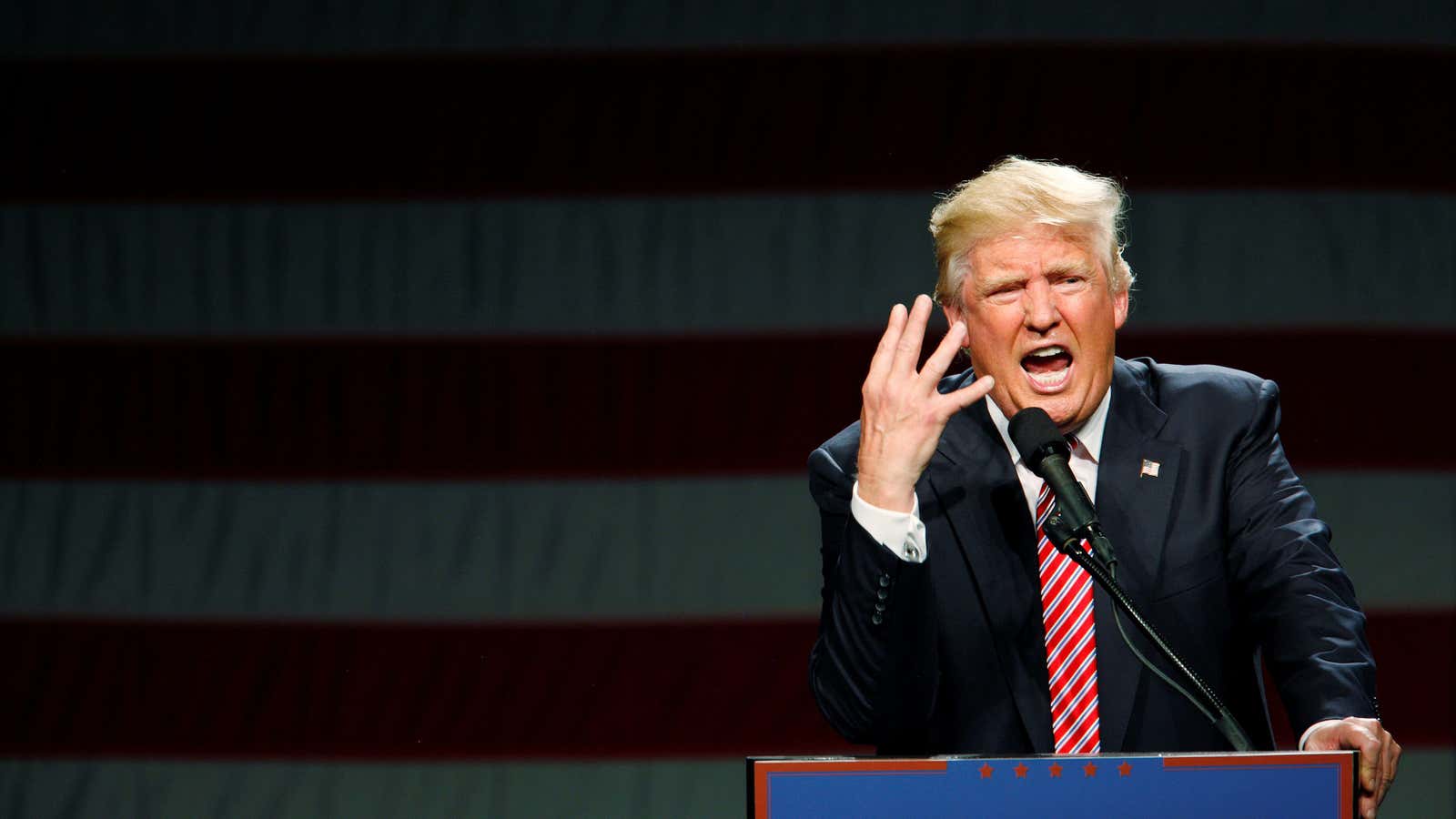Donald Trump’s anti-Semitic tweet—I’m sorry, his allegedly anti-Semitic tweet—is still in the news in the US, and with good reason. The presumptive Republican nominee has repeatedly refused to apologize for linking Hillary Clinton, corruption and Judaism all in one ill-advised meme. Meanwhile, his Jewish son-in-law Jared Kushner is being publicly pressured by one of his employees at the New York Observer (which he owns) to denounce Trump’s actions.
Which brings us to one of the most popular defenses of Trump–namely, that he can’t possibly be anti-Semitic because of his Jewish family. Trump does indeed have a Jewish son-in-law, a Jewish daughter (Ivanka Trump converted to Judaism upon marrying Kushner), and a Jewish grandchild. And it’s totally irrelevant. This argument is not only specious, it elides the great moral question presented by this election: Will America’s legacy be one of peaceful diversity or hate?
Before answering that question, we need to dispatch with one of Trump’s most popular defenses, particularly among his Jewish supporters. As a friend of mine told me when I mentioned I was writing this article: “How can the guy hate Jews when he has Jews in his own family? Do you think he’d be okay with Nazis supporting him when they’d send his own flesh-and-blood to concentration camps?”
But it is very possible to make generalizations about an entire group of people while believing certain individuals within that group are “exceptions.” If this is starting to sound familiar, it’s because racists often use similar reasoning—I’m not racist, I have black friends. Similarly, one can support Israel’s sovereignty for reasons that have nothing to do with respecting Jews as a whole. As Trump has accurately pointed out, Israel has been America’s sole staunch ally in a region that is overwhelmingly hostile to the West. But considering Trump’s well-known animus toward Muslims, such sentiments could just as easily be a Trumpian version of realpolitik. Or, in light of the controversy over US president Barack Obama’s Iran deal, simply a calculated attempt to sway Jewish voters.
Even if Trump’s periodic dabbling in anti-Jewish iconography and stereotypes (which I’ve discussed before) is purely coincidental, Jews and other members of persecuted groups have to make an important decision. Will we only call out prejudice when it’s directed against our own community? Or will we recognize that this type of collectivist thinking is immoral, regardless of its target?
More than any other single theme, Trump’s presidential campaign has been defined by his prejudiced thinking. He refers to minorities in monolithic terms (“the Hispanics,” “the blacks,” “the Muslims”), issues policy proposals based on bigoted assumptions (banning all Muslim travel to the United States, deporting all undocumented Mexican immigrants en masse), and drops sexist comments on a regular basis (a comprehensive compilation can be found here). Along the way, he has unsurprisingly garnered praise from the white supremacist community. Such sentiments have become a central aspect of his campaign, and will send a very clear message if he is elected in November.
Today, I am ostensibly addressing my fellow Jews. But I am also writing to anyone who has faced discrimination because of their race, religion, or gender. As I’ve discussed in the past, I was myself the victim of an anti-Semitic hate crime when I was 12. The attack nearly cost me my life. No matter what your ideology, we need to stand united as Americans first, partisans second.
Even political conservatives don’t have an excuse for pulling the Trump lever. Looking for a non-racist alternative? Libertarian candidate Gary Johnson is at least as conservative as Trump (if not more so, at least on economic issues).
The lesson that Jews must take from this election is that, when a political candidate tries to dehumanize an entire group of people, every single human being has a moral responsibility to fight back. When Trump attacks Mexican immigrants, he attacks Jews; when he threatens Muslims with persecution, he threatens Jews with persecution (a point many right-wing Israelis have lamentably failed to grasp). Jews have faced persecution ourselves, and thus should be particularly empathetic to the suffering of others.
Because I am a Jew, this issue is a particularly poignant one for me. But the stakes in this election would impact me even if I was a Buddhist or an atheist. That said, because I am incapable of distancing myself from my Jewish vantage point, I’d like to conclude with my favorite quote from one of my favorite artists. Diego Rivera was, appropriately enough, both Mexican and Jewish, and he spoke openly about the way his background affected his life. As he once put it: “My Jewishness is the dominant element in my life. From this has come my sympathy with the downtrodden masses which motivates all my work.”
